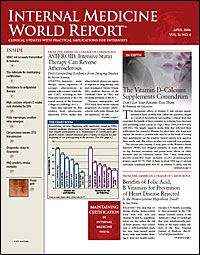Publication
Article
Internal Medicine World Report
Depression after Stroke: More Common than Appreciated
Kissimmee, Fla—Poststroke depression is common but often untreated, according to investigators at the American Stroke Association’s Inter?na?tional Stroke Conference 2006.
The largest study of depression in older adults who survived small subcortical strokes found that about 1 in 5 patients had depression, reported Carole L. White, PhD, of the University of Texas Health Science Center, San Antonio. Yet only about one third of them were being treated for their depression.
In the Secondary Prevention of Small Subcortical Strokes, depressive symptoms 3 months after stroke were evaluated using the Patient Health Questionnaire, a 9-item scale that assesses for depression criteria. Among the 808 stroke survivors who completed the questionnaire, 161 (19.9%) had scores that qualified for a diagnosis of depression.
However, only 36% of those with major depression were being treated with antidepressant medications.
Those with higher levels of disability (Rankin score, 2 or 3) were 56% more likely to be depressed than those with less severe disability (Rankin score, 0 or 1). Compared with stroke patients who did not have depression, those with depression were relatively younger (59 vs 63 years) and had more stroke risk factors, such as diabetes (29% vs 38%) and hypertension. (75% vs 84%). In fact, those with hypertension were 77% more likely to be de?pressed than those without hypertension.
“The prevalence of 20% corroborates the important problem of depression after stroke,” said Dr White.
“It is important to be aware of depression and treat it appropriately, as we know that it can have an impact on recovery,” she continued, adding that “in these patients with small-vessel disease who have multiple vascular risk factors, depression may interfere with their ability and motivation to manage risk factors, thus placing them at increased risk for subsequent stroke.”
Another study of a Veterans Affairs (VA) system population identified an association between poststroke depression and higher health care utilization.
Of 6164 patients diagnosed with acute stroke, 40% had poststroke depression. After adjusting for differences in demographics, stroke type, and other factors, patients with poststroke depression had significantly more hospitalizations, long?er lengths of stay, and more outpatient visits in the 12 months following the stroke than those without depression, reported Linda Williams, MD, chief of neurology at the VA Medical Center in Indianapolis and associate professor of neurology at Indiana University, Indianapolis.
“The question that remains to be answered is whether treating depression successfully results in lower utilization,” said Dr Williams. “I believe that’s true, not only for poststroke depression but depression in general. Depression is linked to somatic symptoms, so you would think that people would have fewer somatic complaints and potentially less utilization. Depression is also linked to increased cardiovascular risk, so if you’re depressed, you have a higher risk of heart attack and stroke, which will increase utilization too.”
She said that depression after stroke is often overlooked, because patients themselves may not be aware of it, and physicians may not recognize it, because they tend to focus on stroke recovery and physical rehabilitation.—W.K.





